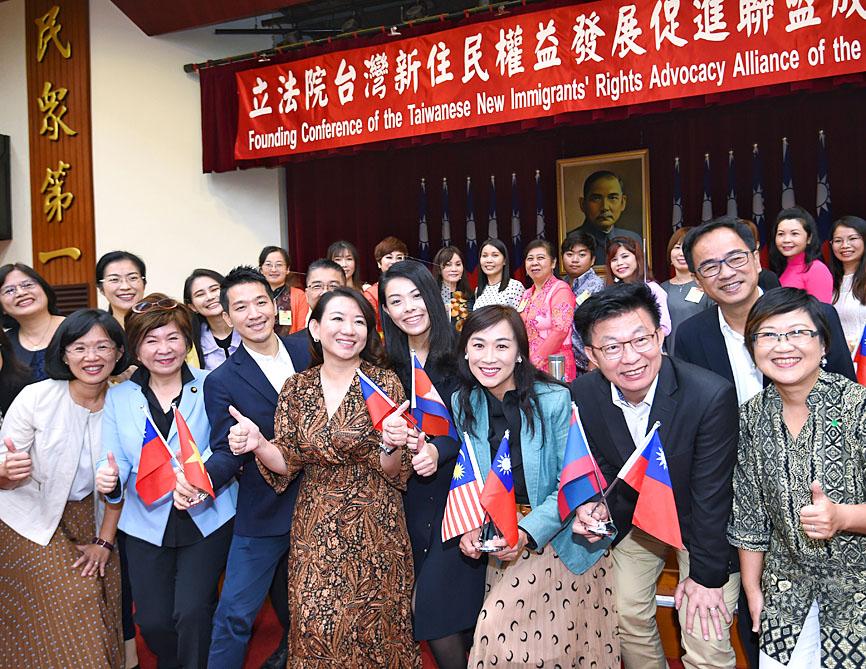Democratic Progressive Party (DPP) Legislator Lo Mei-ling (羅美玲) yesterday launched a coalition to advocate rights protection and improved welfare programs for “new residents” of Taiwan, many of whom had acquired citizenship through marriage to a Taiwanese.
Lo said that she had received much help and support from across the political spectrum ahead of the inauguration of the Taiwanese New Immigrants’ Rights Advocacy Alliance of the Legislative Yuan.
Malaysia-born Lo said that the alliance is needed because the number of “new residents” had reached 560,000, or nearly 1 million when combined with their children who were born in Taiwan.

Photo: Fang Pin-chao, Taipei Times
In coming together under the alliance, lawmakers across party lines see the benefits for Taiwan of working to promote international collaboration, commercial trade, and cultural and educational exchanges with the “home nations” of “new residents.”
Most of the “new Taiwanese citizens” come from Southeast Asian nations, especially Vietnam, Malaysia, Thailand, Indonesia and the Philippines.
“We want ‘new residents’ who live in Taiwan to have security and happiness for their families, as they are the bridges for Taiwan to link with their home nations, becoming the advance guard for the government’s international diplomacy,” Lo said.
Deputy Legislative Speaker Tsai Chi-chang (蔡其昌) in his address at the inauguration of the alliance said that issues affecting “new residents” are very important, and that President Tsai Ing-wen (蔡英文) and the Executive Yuan have implemented many beneficial policies “as our government wants ‘new residents’ to become a new force for Taiwan.”
“‘New residents’ coming to live in Taiwan become Taiwanese, and their children are the new Taiwanese children... I always remind officers in the immigration agency to treat them just like they are Taiwanese,” Minister of the Interior Hsu Kuo-yung (徐國勇) said.

POSITIVE DEVELOPMENT: Japan and the US are expected to hold in-depth discussions on Taiwan-related issues during the meeting next month, Japanese sources said The holding of a Japan-US leaders’ meeting ahead of US President Donald Trump’s visit to China is positive news for Taiwan, former Japan-Taiwan Exchange Association representative Hiroyasu Izumi said yesterday. After the Liberal Democratic Party’s landslide victory in Japan’s House of Representatives election, Japanese Prime Minister Sanae Takaichi is scheduled to visit the US next month, where she is to meet with Trump ahead of the US president’s planned visit to China from March 31 to April 2 for a meeting with Chinese President Xi Jinping (習近平). Japan and the US are expected to hold in-depth discussions on Taiwan-related issues during the

‘LIKE-MINDED PARTNER’: Tako van Popta said it would be inappropriate to delay signing the deal with Taiwan because of China, adding he would promote the issue Canadian senators have stressed Taiwan’s importance for international trade and expressed enthusiasm for ensuring the Taiwan-Canada trade cooperation framework agreement is implemented this year. Representative to Canada Harry Tseng (曾厚仁) in an interview with the Central News Agency (CNA) said he was increasingly uneasy about Ottawa’s delays in signing the agreement, especially as Ottawa has warmed toward Beijing. There are “no negotiations left. Not only [is it] initialed, we have three versions of the text ready: English, French and Mandarin,” Tseng said. “That tells you how close we are to the final signature.” Tseng said that he hoped Canadian Prime Minister Mark Carney

President William Lai (賴清德) yesterday bestowed one of Taiwan’s highest honors on Saint Vincent and the Grenadines (SVG) Ambassador Andrea Clare Bowman in recognition of her contributions to bilateral ties. “By conferring the Order of Brilliant Star with Grand Cordon on Ambassador Bowman today, I want to sincerely thank her, on behalf of the Taiwanese people, for her outstanding contribution to deepening diplomatic ties between Taiwan and SVG,” Lai said at a ceremony held at the Presidential Office in Taipei. He noted that Bowman became SVG’s first ambassador to Taiwan in 2019 and

A man walks past elementary school artworks at the Taipei Lantern Festival in Ximen District yesterday, the first day of the event. The festival is to run from 5pm to 10pm through March 15.